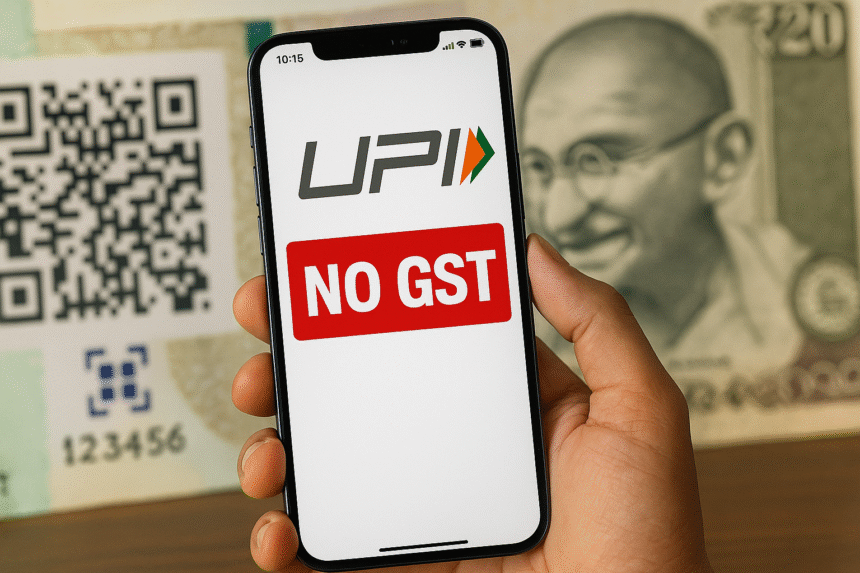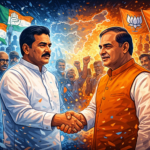Picture this: you buy a ₹20 samosa using UPI. You take a bite, check your phone, and BAM—someone says, “From next week, GST will be charged on all UPI transactions!” The samosa drops. Panic spreads faster than chutney on your kurta.
- Where Did This GST-on-UPI Drama Even Begin?
- Why the Confusion Then?
- Let’s Talk About What UPI Transactions Really Are
- So Is UPI Really Free?
- But Wait—What About Businesses?
- What This Means for You (Spoiler: Good News)
- No GST on UPI: Why It’s Actually a Big Deal
- GST-Free and Glitch-Free (Well, Almost)
- What If You Ever Do See a Fee?
- Moral of the Story: Don’t Believe Everything on WhatsApp
- Final Thoughts: Scan, Pay, Smile — Repeat
But take a deep breath, dear digital devotee. Because here’s the real news—there is no GST on UPI transactions. Yup, zero, zilch, nada.
The government has officially spoken. The Ministry of Finance just ended the WhatsApp university rumors with a solid fact-check. So, before you uninstall your favorite payment app and dig out your grandmother’s piggy bank, let’s break down this whole UPI-GST panic and understand why UPI transactions are still as tax-free as temple prasad.
Where Did This GST-on-UPI Drama Even Begin?
Ah, the world of social media. A beautiful place for memes, but a dangerous zone for half-baked financial gossip.
A viral post began doing rounds: “Govt will now charge GST on every UPI payment. Even ₹10 tea will be taxed!” Now, add dramatic emojis, a few capital letters, and a fake screenshot—and boom! India panics.
But thankfully, the official clarification has come from none other than the Government itself. And it couldn’t be clearer:
No GST on UPI transactions — not now, not ever.
That’s right. Sending money to friends, paying for groceries, tipping your barber, or donating to your favorite temple—all via UPI—remains completely GST-free.

Why the Confusion Then?
Because, well, financial myths spread faster than a trending song. Here’s what might’ve triggered the panic:
- Some business-related digital payment platforms do charge service fees.
- The term “digital service tax” exists in other countries.
- And of course, a few Twitter handles love the chaos more than clarity.
So when someone mixes business fees, international tax jargon, and a sprinkle of fear—it creates one fully desi rumor.
But in India, the rules are still simple and people-friendly: personal UPI transactions are not taxable.
Let’s Talk About What UPI Transactions Really Are
In case you were wondering what the fuss is about, let’s rewind a bit.
UPI (Unified Payments Interface) is that magical tool which lets you pay your street vendor, your cab driver, your Zumba trainer, and even your mom’s kitty party treasurer—all with a tap. No cash. No card swiping. No awkward “change nahi hai” moments.
As per stats, over 14 billion UPI transactions were done in June 2025 alone. From ₹1 to ₹1 lakh, Indians love their UPI like they love cricket and spicy food.
So Is UPI Really Free?
Yes. And here’s why:
- The receiver (like a shop or vendor) might pay a small fee to their bank or payment service provider.
- But for you, the user, it’s free. Whether you send ₹1 or ₹10,000, the government doesn’t charge GST or any fee.
- Even if you send money to the moon (okay, maybe not literally), UPI doesn’t bill you extra.
But Wait—What About Businesses?
Excellent question. For businesses accepting payments through UPI, there are some operational charges involved. Payment gateways like Razorpay or PhonePe Business might levy a minimal MDR (Merchant Discount Rate). But here’s the twist:
Even they don’t pay GST on the actual UPI transaction. The GST, if any, is only on the service charge they collect—not on your ₹50 bhel puri order.
So next time your golgappa vendor accepts UPI and smiles wide, remember—he’s not worried about GST either.
What This Means for You (Spoiler: Good News)
Now that the dust has settled and the rumors buried, let’s look at what it means for us common folks:
1. Continue Scanning with Confidence
Go ahead and buy that ₹10 nimbu pani. You won’t be hit with a ₹1.80 GST surprise.
2. Trust the System
The fact that the government clarified quickly and publicly means digital India is serious about transparency.
3. UPI Remains King
Whether it’s your Netflix buddy payment, rent split, or weekend snack binge — UPI is still your best, safest, and tax-free buddy.
No GST on UPI: Why It’s Actually a Big Deal
Think about it. In an era where every bite you take and every sip you drink comes with some kind of tax, UPI transactions are still free. No strings. No hidden clauses.
This builds trust. Encourages cashless behavior. And strengthens the digital economy.
If a person knows that paying digitally won’t cost extra, they’re more likely to switch from cash. It also:
- Reduces black money.
- Improves traceability.
- Makes budgeting super easy (hello, transaction history!).
GST-Free and Glitch-Free (Well, Almost)
Of course, we’re not saying the UPI universe is perfect. Sometimes servers crash. Sometimes the QR code won’t scan. And sometimes your friend promises to “pay you back via UPI” and forgets. But one thing’s for sure:
No GST is the best feature you never asked for but deeply appreciate.
What If You Ever Do See a Fee?
Okay, here’s a rare case:
If you’re using a credit card linked to UPI, your bank may charge a transaction fee (not GST). That’s a banking policy, not a government tax.
And again, it’s not related to the core UPI system, which remains free and untaxed.
Moral of the Story: Don’t Believe Everything on WhatsApp
We Indians trust forwards more than our inner voice sometimes. But when it comes to money matters, it’s important to double-check. Especially when the topic is as sensitive as GST and UPI transactions.
So, here’s a rule of thumb:
If someone sends you a text saying, “Starting tomorrow, ₹1 GST on all UPI transactions,” just send them this article.
Or better, send them ₹1 with the message “No GST, bhai!”
Final Thoughts: Scan, Pay, Smile — Repeat
The world is already complicated with EMIs, rising prices, and confusing stock market charts. Let’s be grateful for the little things — like the freedom to scan a QR code and pay ₹20 for a sandwich without paying ₹22.36.
So, enjoy this freedom. Celebrate the government’s clarity. And spread the word:
There’s NO GST on UPI transactions. Not today. Not in Sawan. Not in the next budget.
Digital India just got a thumbs up again — now go ahead and scan it.












